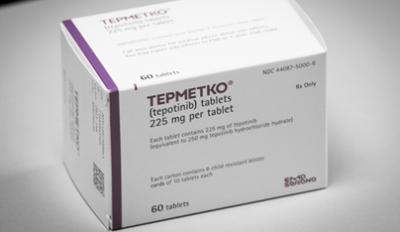Tepotinib Dosage
Medically reviewed by Drugs.com. Last updated on Aug 5, 2024.
Applies to the following strengths: 225 mg
Usual Adult Dose for:
Additional dosage information:
Usual Adult Dose for Non-Small Cell Lung Cancer
450 mg orally once a day
Duration of therapy: Until disease progression or unacceptable toxicity
Use: For the treatment of patients with metastatic non-small cell lung cancer (NSCLC) harboring mesenchymal-epithelial transition (MET) exon 14 skipping alterations
Renal Dose Adjustments
Mild or moderate renal dysfunction (CrCl 30 to 89 mL/min): No adjustment recommended.
Severe renal dysfunction (CrCl less than 30 mL/min): Data not available
Comments:
- Recommended dosage has not been established for patients with severe renal dysfunction.
Liver Dose Adjustments
Mild or moderate liver dysfunction (Child-Pugh A or B): No adjustment recommended.
Severe liver dysfunction (Child-Pugh C): Data not available
During Therapy:
Increased ALT and/or AST without increased total bilirubin:
- Grade 3: This drug should be withheld until recovery to baseline ALT/AST; if recovered to baseline within 7 days, then this drug can be resumed at the same dose, otherwise it should be resumed at a reduced dose (225 mg orally once a day).
- Grade 4: This drug should be permanently discontinued.
Increased ALT and/or AST with increased total bilirubin (without cholestasis or hemolysis):
- ALT and/or AST greater than 3 times the upper limit of normal (3 x ULN) with total bilirubin greater than 2 x ULN: This drug should be permanently discontinued.
Increased total bilirubin without concurrent increased ALT and/or AST:
- Grade 3: This drug should be withheld until recovery to baseline bilirubin; if recovered to baseline within 7 days, then this drug can be resumed at a reduced dose (225 mg orally once a day), otherwise it should be permanently discontinued.
- Grade 4: This drug should be permanently discontinued.
Comments:
- Pharmacokinetics and safety have not been studied in severe liver dysfunction.
Dose Adjustments
Recommended dose reduction for adverse reaction management: 225 mg orally once a day
If patients are unable to tolerate 225 mg/day: This drug should be permanently discontinued.
Interstitial Lung Disease (ILD)/Pneumonitis:
- Any grade: This drug should be withheld if ILD is suspected; if ILD is confirmed, this drug should be permanently discontinued.
Other Adverse Reactions:
- Grade 2: Dose level should be maintained; if intolerable, withholding this drug until resolved should be considered, then it should be resumed at a reduced dose.
- Grade 3: This drug should be withheld until resolved, then it should be resumed at a reduced dose.
- Grade 4: This drug should be permanently discontinued.
Precautions
CONTRAINDICATIONS: None
Safety and efficacy have not been established in patients younger than 18 years.
Consult WARNINGS section for additional precautions.
Dialysis
Data not available
Other Comments
Administration advice:
- Select patients for treatment based on the presence of MET exon 14 skipping alterations in plasma or tumor specimens.
- Testing for the presence of MET exon 14 skipping alterations in plasma specimens is recommended only if a tumor biopsy cannot be obtained.
- Reevaluate the feasibility of biopsy for tumor tissue testing if an alteration is not detected in a plasma specimen.
- A US FDA-approved test for detection of MET exon 14 skipping alterations in NSCLC for selecting patients for treatment with this drug is not available.
- Administer with food at about the same time each day.
- Swallow tablets whole; do not chew, crush or split tablets.
Storage requirements:
- Store at 20C to 25C (68F to 77F); excursions permitted to 15C to 30C (59F to 86F).
- Store in original package.
General:
- This indication was approved under accelerated approval based on overall response rate and duration of response; continued approval may depend on verification and description of clinical benefit in confirmatory trials.
Monitoring:
- Hepatic: Liver function tests, including ALT, AST, and total bilirubin (before starting therapy, every 2 weeks during the first 3 months of therapy, then once a month or as clinically indicated)
- Respiratory: For new/worsening pulmonary symptoms indicative of ILD/pneumonitis
Patient advice:
- Read the US FDA-approved patient labeling (Patient Information).
- Contact health care provider immediately to report new/worsening respiratory symptoms.
- Contact health care provider immediately for signs/symptoms of liver dysfunction.
- Females of childbearing potential and male patients with female partners of childbearing potential: Use effective contraception during therapy and for 1 week after the last dose.
- Do not breastfeed during therapy and for 1 week after the last dose.
- If you missed a dose, take the dose as soon as possible; if your next dose is due within 8 hours, skip the missed dose and resume with the next scheduled dose.
- If vomiting occurs after a dose, take the next dose at the next scheduled time.
More about tepotinib
- Check interactions
- Compare alternatives
- Side effects
- During pregnancy
- Drug class: multikinase inhibitors
- Breastfeeding
- En español
Patient resources
Other brands
Professional resources
Other brands
Related treatment guides
Further information
Always consult your healthcare provider to ensure the information displayed on this page applies to your personal circumstances.


